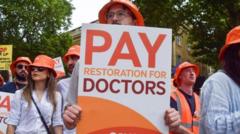Are Doctors' Unions Acting Like a Cartel? Streeting Weighs In

Published: 2025-11-12 17:00:18 | Category: technology
The British Medical Association (BMA) has come under fire from Health Secretary Wes Streeting, who accused the doctors' union of acting "like a cartel" and jeopardising the future of the National Health Service (NHS). This criticism comes as resident doctors prepare for their 13th strike in an ongoing dispute over pay, set to begin on Friday. Streeting's remarks highlight a growing tension between the government and the BMA, particularly regarding funding and pay levels, raising important questions about the NHS's sustainability and its impact on patient care.
Last updated: 22 October 2023 (BST)
What’s happening now
The BMA is poised to initiate a five-day strike starting from 07:00 GMT on Friday, marking a significant escalation in their ongoing dispute with the government over pay and working conditions. The strike follows the breakdown of negotiations, where the government proposed a deal to cover exam fees and enhance training opportunities, which the BMA rejected, insisting that pay must be addressed first. Streeting has firmly stated that he will not negotiate on pay, arguing that resident doctors have already received substantial pay rises over the past three years.
Key takeaways
- Health Secretary Wes Streeting has accused the BMA of cartel-like behaviour.
- The upcoming strike marks the 13th walkout by resident doctors amid a long-standing pay dispute.
- The government has rejected further pay negotiations, citing recent pay increases for doctors.
- The BMA argues that despite these increases, real pay has fallen significantly since 2008.
- Streeting critiques the BMA's opposition to higher taxes for the wealthy as a means to support public services.
Timeline: how we got here
Since the beginning of the dispute, several key milestones have occurred:
- January 2021: Resident doctors begin raising concerns about pay and working conditions.
- June 2021: The first strike initiated by the BMA, signalling the start of ongoing tensions.
- September 2022: Government proposes a pay deal that is rejected by the BMA.
- October 2023: Thirteenth strike announced, set to begin on 27 October.
What’s new vs what’s known
New today/this week
Wes Streeting's recent comments have heightened tensions between the government and the BMA. His assertion that the BMA's actions threaten the NHS's future has sparked further debate about the role of the union and the impact of the strikes on patient care.
What was already established
The ongoing dispute has been characterised by a series of strikes and negotiations that have not resulted in a satisfactory resolution for either party. The BMA maintains that despite recent pay increases, the real value of doctors' salaries has significantly decreased due to inflation and rising costs of living.
Impact for the UK
Consumers and households
The strikes are likely to disrupt NHS services significantly, leading to delays in treatments and consultations for patients. With the NHS already under pressure, particularly during winter months, the strikes could exacerbate wait times and affect patient outcomes. Households relying on NHS services may face increased uncertainty regarding their healthcare access.
Businesses and jobs
For businesses that depend on a healthy workforce, the ongoing strikes may have indirect effects. Delayed treatments can lead to increased absenteeism and reduced productivity. Additionally, the NHS employs a vast number of individuals, and ongoing disputes could raise concerns about job security and morale among NHS staff.
Policy and regulation
Streeting's comments suggest a potential shift in government strategy regarding healthcare funding, particularly concerning taxation. The proposal for higher taxes on wealthy individuals to bolster NHS finances may face resistance from various sectors, including the BMA. Upcoming consultations and discussions on healthcare funding may become increasingly contentious as both sides seek to assert their positions.
Numbers that matter
- 30%: Total pay rise received by resident doctors over the past three years.
- £127,500: Average salary of NHS consultants in the last year.
- 20%: Reduction in real pay for resident doctors since 2008 when adjusted for inflation.
- 1.5 million: People in the NHS that Streeting claims to represent.
- 5 days: Duration of the upcoming strike by resident doctors.
Definitions and jargon buster
- BMA: British Medical Association, the trade union representing doctors in the UK.
- NHS: National Health Service, the publicly funded healthcare system in the UK.
- Resident doctors: Also known as junior doctors, these are qualified doctors who are in training to become specialists.
How to think about the next steps
Near term (0–4 weeks)
In the immediate future, the five-day strike will take place, and patients should prepare for potential disruptions in services. Those needing non-urgent medical care may face delays, and it is advisable to stay informed about updates from the NHS and local health authorities.
Medium term (1–6 months)
The ongoing negotiations and strikes could lead to further action from the BMA if no resolution is reached. The government may need to reconsider its stance on pay and funding, especially if public pressure mounts regarding NHS services.
Signals to watch
- Upcoming announcements from the BMA regarding further strike actions or negotiations.
- Government responses to public demands for increased funding for the NHS.
- Public opinion on the strikes and their impact on healthcare services.
Practical guidance
Do
- Stay informed about the latest developments regarding the strikes and NHS services.
- Plan non-urgent medical appointments around the strike dates.
- Engage in discussions about healthcare funding to understand different perspectives.
Don’t
- Do not ignore notifications from healthcare providers regarding cancellations or rescheduling.
- Do not assume that services will remain unaffected during the strike period.
- Do not overlook the importance of supporting NHS staff during this challenging time.
Checklist
- Have you checked your appointment status with the NHS?
- Are you aware of which services may be disrupted during the strike?
- Have you made alternative arrangements for healthcare if necessary?
- Have you considered the implications of the strikes on public healthcare funding?
- Are you following credible news sources for updates on the situation?
Risks, caveats, and uncertainties
The situation remains fluid, with ongoing negotiations and potential further strikes looming. The BMA's strategy and the government's response could change rapidly, leading to uncertainties about the future of NHS funding and services. Additionally, public sentiment could influence the government's approach, making it crucial to monitor developments closely.
Bottom line
The escalating conflict between the BMA and the government underscores significant challenges facing the NHS. As resident doctors prepare for another strike, the implications for patient care and healthcare funding remain critical. A resolution to this dispute is essential not only for the future of the NHS but also for the well-being of patients relying on its services.
FAQs
What is the current dispute between the BMA and the government?
The current dispute revolves around pay and working conditions for resident doctors, with ongoing strikes highlighting tensions over financial support for the NHS.
How long is the upcoming strike by resident doctors?
The upcoming strike is set to last five days, beginning at 07:00 GMT on Friday.
What impact will the strikes have on NHS services?
The strikes are likely to cause significant disruptions to NHS services, leading to delays in treatments and increased pressure on other healthcare staff.



